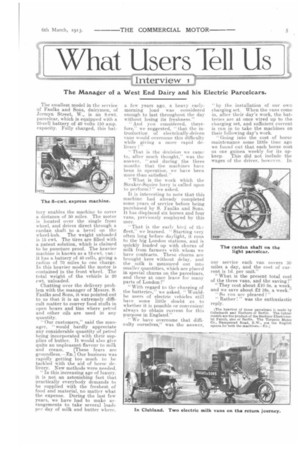What Users Tell Us 4 Interview
Page 5

If you've noticed an error in this article please click here to report it so we can fix it.
The Manager of a West End Dairy and his Electric Parcelcars.
The smallest model in the service of Faulks and Sons, dairymen, of Jermyn Street, W., is an 8-cwt. parcelcar, which is equipped with a 20-cell battery of 40 volts 150 amp. capacity, Fully charged, this bat tery enables the machine to cover a distance of 50 miles. The motor is located over the single front wheel, and drives direct through a eardan shaft to a bevel on the wheel-hub. The weight unloaded is 16 cwt. The tires are filled with a patent solution, which is claimed to be puncture proof. The heavier machine is known as a 12-cwt. van : it has a battery of 40 cells, giving a radius of 70 miles to one charge. In this heavier model the motor is contained in the front wheel.The total weight of the vehicle is 20 cwt. unloaded.
Chatting over the delivery problem with the manager of Messrs. S. Faulks and Sons, it was pointed out to us that it is an extremely difficult matter to convey food stuffs in open boxes and tins where petrol and other oils are used LB any quantity. "Our customers," said the manager, "would hardly appreciate any considerable quantity of petrol being incorporated with their supplies of butter. It would also give quite an unpleasant flavour to milk and cream. [These fears are groundless.—En.] Our business was rapidly getting too much to he tackled with the aid of horse delivery. New methods were needed.
"In this increasing age of luxury. it is not an astonishing fact that practically everybody demands to be supplied with the freshest of food and material, no matter what the expense. During the last few years, we have had to make arrangements to take several loads per day of milk and butter where.
a few years ago, a heavy .earlymorning load was considered enough to last throughout the day without losing its freshness."
" And you considered, therefore," we suggested, "that the introduction of electrically-driven vans would overcome this difficulty while giving a more rapid delivery? "
"That is the decision we came to, after much thought," was the answer, "and during the three months that the machines have been in operation. we have been more than satisfied."
'What is the work which the Straker-Squire lorry is called upon to perform?" we asked.
It is interesting to note that this machine had already completed sonic years of service before being purchased by S. Faulks and Sons. It has displaced six horses and four vans, previously employed by this user.
" That is the early biri of thi? fleet," we learned. "Starting very often long before daylight, it runs to the big London stations, and is quickly loaded up with churns of milk from farmers with whom we have contracts. These churns are brought here without delay, and the milk is measured out into smaller quantities, which are placed m special churns on the pareelcars, and these at once leave for many parts of London'?"
"With regard to the charging of the batteries," we asked. "Wouldbe users of electric vehicles still have some little doubt as to whether it is possible or convenient. always to obtain current for this purpose in England."
"We have overcome that difficulty ourselves," was the answer, " by the installation of our own charging set. When the vans come. in, after their day's work, the batteries are at once wired up to the charging set, and sufficient current is run in to take the machines on their following day's work. "Going into the cost oE horse maintenance some little time ago we found out that each horse cost us one guinea weekly for its upkeep. This did not include the wages of the driver, however. In.
our service each van covers SO miles a day, and the cost of current is Id. per unit."
"What is the present total cost of the three vans, and the saving r "They cost about £10 5s. a week, and we save about £2 16s. a week." "So you are pleased ? "
"Rather " was the enthusiastic reply.
IThe heaviest of these pareelears is made by Gabehardt and Harhorn of Berlin. The lighter models are the product of the Berliner Eleotromobil Fabrik, also of Berlin. The Torpedo Motor Co., Hampstead Road, N.W., are the English agents for both the maehines.—En.]
























